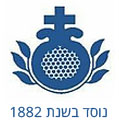You are here
Gastroenterology Unit
The Gastro Institute of the Holy Family Hospital has been providing quality service to the residents of the North for over 25 years.
In recent years, the institute underwent a fundamental change 4 years ago when it was moved to a new large and spacious department, very convenient for patients and attendants. Recently, the hospital management also purchased some of the newest endoscopic equipment in the world.
What is special about the institute:
The institute employs 15 expert gastroenterologists, among the best in the field, 25 qualified nurses and assistants, and an available and courteous clerical system.
The institute provides service seven days a week in two shifts - morning and evening, in three operating rooms simultaneously, making it possible to set appointments that are among the shortest in Israel, if not the shortest ones.
The process of cleaning and storing the endoscope, after use, is conducted under strict conditions according to the procedures of the Ministry of Health and JCI, which is very important in maintaining and preventing the transmission of infections to patients.
The services that the Unit provides:
Gastroscopy and colonoscopy with biopsies, resection, and marking of lesions.
Insertion of a feeding tube into the stomach for special patients - for example, patients after a stroke
Replacing the feed tube as needed
EUS endoscopy ultrasound examination - intended for examination of the gallbladder, biliary tract, and pancreas. During the procedure, it is possible to diagnose and take a sample from lesions for histology and cytology. The test is performed by a gastroenterologist.
The vision of the Unit
To make the services provided in the field of gastroenterology accessible to the residents of the area and thus save them trips to distant hospitals.
New services introduced in the last two years:
1. Excision of complex lesions from the digestive system, which is known as EMR:
Removal of polyps that are defined as complex due to their size, shape, or location, requires a special method to remove them. It is done by gastroenterologists who are specialized in this method.
It should be noted that these patients previously had to undergo surgical excision of the lesions, which involves general anesthesia and surgery.
2. Endoscopic examination under anesthesia:
The department of anesthesiology uses high-quality drugs that induce good sedation so that the patient goes through the test without feeling discomfort or pain. It is important to emphasize that the patient is constantly monitored on the vital signs (pulse, blood pressure, and oxygen concentration in the blood).
Patients with complex underlying diseases, such as chronic diseases or heart failure, should be given sedation for endoscopy by anesthesiologists.
The institute provides endoscopic services in the presence of an anesthesiologist for such patients.
3. Surgical oncology clinic:
Patients who are diagnosed with cancerous tumors in the digestive tract are asked to arrive at the clinic (which does not involve a financial charge) for a consultation, even before receiving the biopsy answer. Surgeons, oncologists, and gastroenterologists participate in the consultation meeting and discuss with the patient and his family the diagnosis and the therapeutic possibilities, and potential additional tests to assess the progress of the disease - CT / MRI. These tests can be done in our hospital within a very short time.
4. Tutoring medical students:
The hospital is affiliated to the Faculty of Medicine in Safed, therefore groups of medical students from the Faculty of Safed come to the institute every year for training in gastroenterology.
We are about to introduce the ERCP test, a unique therapeutic procedure to diagnose and treat problems in the liver, gallbladder, bile ducts, and pancreas. The gallbladder stones, for example, can be removed with this technique.
What is the estimated time for performing a gastroscopy?
The duration of the test is 3-5 minutes.
Recovery - 1 hour
The total time in the Unit is about 2 hours
What is the estimated time to perform a colonoscopy?
The duration of the test is about 10-30 minutes
Recovery - 1 hour
The total time in the Unit is about 2 hours
Do you perform colonoscopy and gastroscopy for adults over the age of 75?
Yes. To set up an appointment for a patient above the age of 75, a doctor's referral letter, including medical history and regular medications, must be sent to fax 074-7231729.
After that, the institute's director reviews the request, and we will contact you to schedule an appointment.
What is the preparation for a gastroscopy/endoscopy?
Fasting from food for 8 hours. You can drink water up to 4 hours before the test.
On the day of the test, you must bring a doctor's referral letter + a financial authorization letter for gastroscopy - code 43235 + a financial authorization letter for biopsy - code 88305 + a driving companion. If you cannot get an escort, you can arrive at the Unit without driving and you will be discharged two hours after the end of the examination.
Do I need an escort for a colonoscopy?
Yes, an escort is required, you will receive sedation and you cannot leave the Unit alone, therefore the presence of an escort is mandatory.
If you cannot get an escort, you can arrive at the Unit without driving and you will be discharged two hours after the end of the examination.
Should blood thinners be stopped?
In regards to stopping medication, you should consult your treating physician.
Is it possible to perform a test for someone who has a pacemaker?
Yes, it is possible to do a test with a pacemaker. The patient must bring the details of the pacemaker + cardiologist consultation.
Are tests done with anesthesia, and how is it performed?
Yes, it is possible to perform the test with anesthesia. You need to set up an appointment with the anesthesiologist (04-6508900).
On the day of the anesthesiologist check-up, you must bring:
ECG result, chest x-ray result, complete blood test, detailed doctor's referral letter, including your regular medications.
What about patients who are not competent to sign an informed consent?
For patients who are not qualified to sign an informed consent to perform the test, a legal guardian must be present. The legal guardian will sign instead of the patient.
How do you prepare for a colonoscopy?
On our website, you can find the preparation instructions in Arabic, Hebrew, Russian, and English. Please note, that the preparation is divided into Picolax and Meroken, and there are different instructions for morning (8:00 - 14:00) and evening (15:00-20:00) appointments.
Are colonoscopy and gastroscopy performed under the age of 18?
Yes. To set up an appointment for a patient under the age of 18, a doctor's referral letter, including medical history and regular medications, must be sent to fax 074-7231729.
After that, the institute's director reviews the request, and we will contact you to schedule an appointment.


